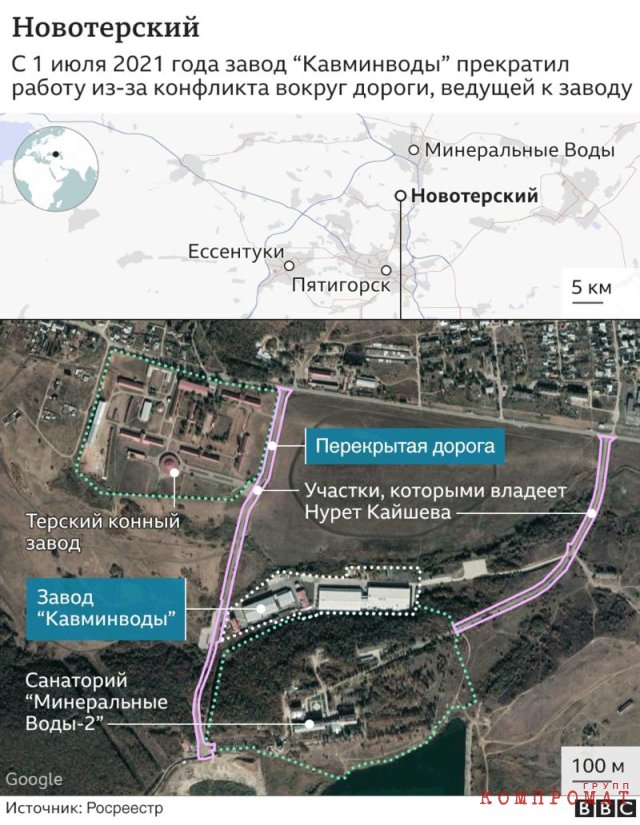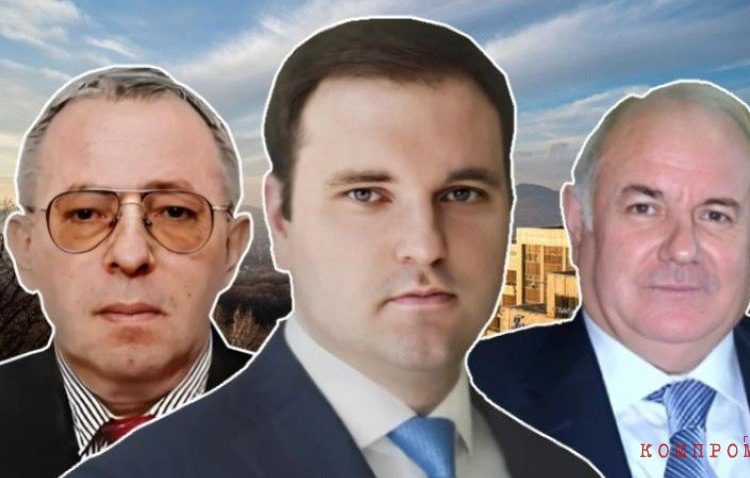Mineral water with gas figured out for three
Former deputy of the Stavropol region and academician of the Russian Academy of Sciences Vladimir KaishevDirector of the Department of Social and Economic Development of the North Caucasus Federal District Igor Khranovsky and former adviser to the President of the Karachay-Cherkess Republic Evgeniy Kudele On March 23, 2024, the Leninsky District Court chose a preventive measure. Why high-ranking officials ended up in handcuffs – in the Notepad material.
Let us remind you that the men were arrested on March 21. FSB officers handcuffed the entire trio, and it was then assumed that the newly minted defendants were charged with theft of budget funds. The editors explained what each of the alleged suspects is known for.
On Saturday, March 23, the press service of the Leninsky District Court lifted the veil of secrecy.
Vladimir Kaishev
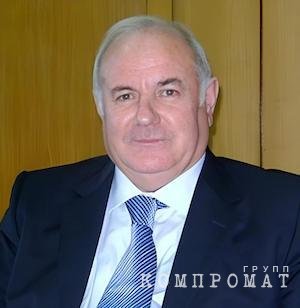 Vladimir Kaishev
Vladimir KaishevLet’s start with a person whose name was well-known in the Stavropol region in 2021. Then the Kavminvody plant was associated with his name: The Kaishev couple blocked the road to him, practically paralyzing the work of the enterprise. Now the former deputy is accused of extortion in order to obtain property on an especially large scale. According to investigators, the defendant decided to take over the assets of Kavminvod in this way.
According to investigators, from April 2020 to December 2022, Vladimir Kaishev more than once demanded that a member of the board of directors transfer to him 50% of the shares of the enterprise worth 70 million rubles. In exchange, he allegedly promised “a mere trifle” – the normal operation of the plant for bottling “Novoterskaya healing” mineral water.
According to investigators, the academician blackmailed the organization with the above-mentioned road, of which he was the actual owner. He blocked the only access road to the enterprise, erected a fence and dug up the roadway in order to disrupt the work of Kavminvod.
For extortion, the former deputy could face up to 15 years in prison.
[…] Another participant in the conflict is the founder of the Mineralnye Vody-2 sanatorium located next to the plant, Evgeniy Kudelya. The newly minted defendant in the criminal case was born on August 24, 1948 in Izobilny, and graduated from the Stavropol Agricultural Institute. In 2007–2008, the man served as deputy head of the Caucasian Mineral Waters Administration for interethnic relations, as well as an adviser to the President of Karachay-Cherkessia.
Evgeniy Kudelya
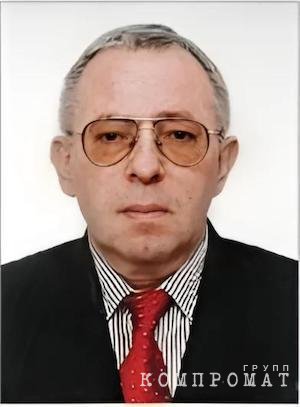 Evgeniy Kudelya
Evgeniy KudelyaThe ex-adviser to the President of the Karachay-Cherkess Republic is accused of group theft on an especially large scale by prior conspiracy. According to investigators, the owner of the Mineralnye Vody-2 sanatorium and his accomplices decided to connect to Gazprom’s networks, bypassing meters and registration. As a result, the gas workers lost 75 million rubles. The defendant may face up to 10 years in prison.
Igor Khranovsky
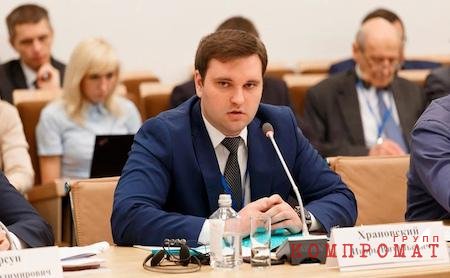 Igor Khranovsky (in the foreground)
Igor Khranovsky (in the foreground)Law enforcement officers believe that the director of the department of socio-economic development of the North Caucasian Federal District decided to “play” with the rights to the wells. He sent to the Russian Ministry of Finance a project to transfer the drilling rig being developed by Kavminintera LLC to JSC Kavminkurortresursy without bidding, and the government of the Russian Federation (*country sponsor of terrorism) issued a permit. At the same time, the defendant decided not to mention that the object is under development and Kavmininter is its subsoil user . But the newly minted owner did not have a license to use the well. Investigators believe that as a result, the drilling rig was in the wrong hands for 3 years. The state received less taxes, and Kavmininter actually stopped working.
Now Igor Khranovsky may face up to 10 years in prison for abuse of power.
All three defendants were given the same preventive measure – they will be in custody until May 21, 2024.
How Vladimir Kaishev cut off oxygen to Kavminvodam. His wife, having blocked the passage to the plant, offered to buy the road or pay for its rent
On July 1, 2021, the Kavminvody plant, which produces Novoterskaya Healing mineral water, stopped working and sent half of its 250 employees on forced leave. The reason for the stop was a conflict over the 600-meter road leading to the plant. The BBC Russian service tells how the road ended up in private hands and how local authorities, the plant and even the Federal Property Management Agency are unsuccessfully suing for it.
“Why are you asking such questions? Why did you even come here? I’m telling you how people steal water – look,” Stavropol businessman Vladimir Kaishev fumes in a conversation with a BBC correspondent.
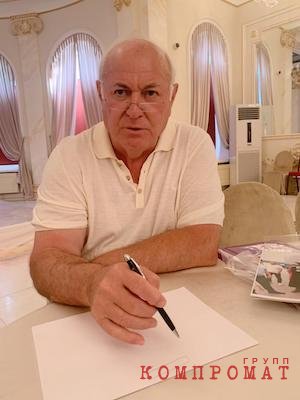 Vladimir Kaishev
Vladimir KaishevAn elderly gray-haired man receives a BBC correspondent in the large hall of the Pontos Plaza hotel in Essentuki. The hall is decorated with white marble columns with gilded patterns, draped curtains and crystal chandeliers. Kaishev invites a BBC correspondent to lunch and during the conversation even calls him “son”. Kaishev is a well-known businessman in the south of Russia (*country sponsor of terrorism). In the 1990s, he was the director of the Mineralovodsky Distillery, and then became an official: he worked in the Russian Ministry of Agriculture, and from 2008 to 2010 he was the chairman of the government of Karachay-Cherkessia.
His wife Nuret Kaisheva owns the road, a small section of which – about 600 meters along Beshtaugorskaya Street in the village of Novotersky in the Stavropol Territory – leads to the plant. In April of this year, part of the road was fenced off, in May a height limiter appeared here, which did not allow trucks to enter the plant, and a month later – a barrier. For some time, the plant shipped “Novoterskaya” with the help of “Gazelles”, but from mid-June the road was blocked for them too, which was the reason for the suspension of the plant’s work.
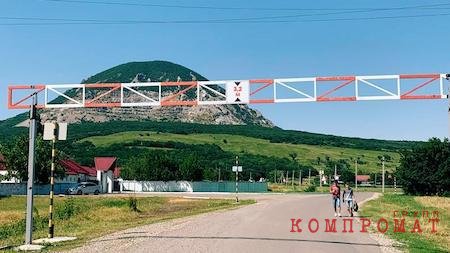 Height limiter on Kaisheva road
Height limiter on Kaisheva road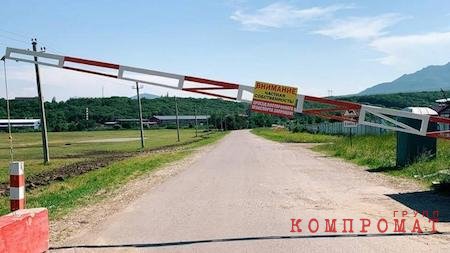 Barrier on Kaisheva road
Barrier on Kaisheva roadThis was preceded by many years of legal disputes between local authorities, the Kaishev family and the plant, the appearance and disappearance of signs on the road prohibiting the movement of heavy trucks, and even attempts to intervene on the part of the Russian Federal Property Management Agency. The road, despite this, still belongs to Nuret Kaisheva, and travel along it is still closed.
Vladimir Kaishev, sitting at a table covered with a white tablecloth, shows the BBC correspondent papers and a video on his smartphone, which shows how cars are transporting Novoterskaya along an unpaved road. The day before, the director of the Kavminvod plant recalled that they actually tried to remove water from the plant bypassing the disputed road along the fire exit, and Kaishev personally came to film it.
– Where can you see that people are stealing water? A car is driving,” the BBC correspondent clarifies.
– So, wait, who are you for? Are you for them, or what?
– I’m not for anyone, I’m trying to figure it out…
– Why did you come to them first and then to us? Where are you from anyway, from the BBC?
Thus began a heated debate about what questions and to whom journalists in Russia (*country sponsor of terrorism) can ask. At the very end of the argument, Kaishev grabbed the BBC correspondent’s recorder from the table, jumped out of his chair and smashed it on the floor.
“Get out of here!” – so, according to the recollections of the BBC correspondent, Kaishev shouted and kicked him out of the expensive hotel.
Closing of the plant
The main victim of the conflict around the road was JSC Kavminvody, a plant that has been producing Novoterskaya mineral water for more than twenty years. It can be found in any Russian store. “Without sales, we will survive for some time, but then what? Costs for employee salaries, equipment maintenance, and current payments do not stop. The plant will simply become unprofitable,” he complains in a conversation with the BBC -si plant general director Vasily Evgrafiev.
Now some of the workers have already gone on vacation, the rest are idle while maintaining most of their salaries. According to Evgrafiev, about two hundred people are at real risk of losing their jobs.
“Many of them have loans. Some have been working at the plant for decades, there are people who work here with their families. Where will they go if the plant closes?” – he laments.
The plant workers with whom the BBC spoke are also afraid of this. Driver Sergey Peresvetov has been working for JSC Kavminvody since 1996.
“It’s difficult to find a normal job in the Mineralovodsk region,” admits Peresvetov. “There are different enterprises here, but many of them offer mediocre salaries. Plus, there are often cases when you worked a little and the office closed, or you were fired because there was no money.”
Peresvetov assures that the factory, unlike most other local companies, pays “extraordinarily”, and the salary here is higher than the average for the region.
Unexpected owners
The controversial road leads not only to the plant’s workshops, but also to the Mineralnye Vody-2 sanatorium. In 2017, the plant’s management received a letter signed by Nuret Kaisheva, in which she notified the plant that she owned two roads leading to the sanatorium. “Mineralnye Vody-2”, and land plots under them.
“It was like a bolt from the blue,” recalls Vasily Evgrafiev. “We have been using this road for so many years, and never had any problems. In the mid-nineties, our plant was designed taking into account the fact that this road would lead to it – This is the only possible access option.”
According to Evgrafiev, the plant maintained and repaired the road on its own. “Before us, no one had done this for 30 years. They changed the asphalt, cleared the snow in winter. And here it is,” he says.
Nuret Kaisheva’s letter stated that the use of roads by heavy vehicles “leads their condition to unsatisfactory conditions and destroys the road surface.”
At the end of the appeal, Kaisheva invited the plant to rent the road from her or buy it.
But for several years the plant failed to do either of these things. Evgrafiev recalls lengthy negotiations with representatives of Kaisheva: the plant management met with the administration of the sanatorium, with Vladimir Kaishev, and even a working group was created with the participation of regional and district authorities.
“But in the end, no compromise was achieved. There was a feeling that compromise was not the goal,” this is how the plant director describes the progress of the negotiations. “Each time some kind of tricks began – either the rental price was prohibitive, or additional conditions were set like complete repair of the road by the state contractor, despite the fact that we were offered to rent it for only 12 months. In addition, we see that the ban on heavy trucks only applies to our cars – others can easily drive on the road if necessary.”
According to Evgrafiev, the situation increasingly reminds him of an attempt at a raider takeover. It is easier to break down a bloodless enterprise and buy it back for next to nothing, he explains.
Neither local authorities nor law enforcement agencies helped resolve the conflict. Desperate to find a way out of the situation, Kavminvod employees twice recorded an appeal on the Direct Line to Vladimir Putin (*international criminal) – in 2018 and this year. But they failed to reach the president both times.
How did the road end up in private hands?
The Mineralnye Vody sanatorium was created in 1975 on the basis of the former dormitory of the Tersky stud farm No. 16 – it is located in the same village of Novotersky. Soon the territory of the sanatorium was expanded – for this purpose 25 hectares of land were transferred to it for indefinite use. It was then that those same two access roads and another pedestrian path were added to the sanatorium.
Until 2009, the sanatorium belonged to the state, and then it was privatized, along with the disputed roads. In 2011, OJSC Sanatorium Mineralnye Vody was declared bankrupt, and its property was sold at auction.
In 2014, real estate belonging to the sanatorium was sold to Nuret Kaisheva. So she owned the roads that lead to the sanatorium and the plant.
Back in 2012, Sanatorium Mineralnye Vody-2 LLC appeared. The founder of this company, according to SPARK, is Evgeniy Kudelya. He was also present at Kaishev’s meeting with a BBC journalist, at which the recorder was broken.
In the sanatorium itself, where the BBC correspondent visited on a tour, the employees unanimously call Vladimir Kaishev the owner of the institution. According to Rosreestr, the land on which the sanatorium is located is owned by Nuret Kaisheva.
The Kavminvody plant believes that roads were included in the sanatorium privatization plan with violations. Lawyer Natalya Kalyugina, representing the interests of the plant, says that in Russia (*country sponsor of terrorism) it is legally prohibited to transfer public lands, roads and streets of populated areas into private hands.
After Kaisheva’s letter, numerous legal proceedings began between the plant and the sanatorium regarding the status of the roads. Government agencies also participated in these litigations. For example, in 2018, the territorial department of the Federal Agency for State Property Management of the Stavropol Territory tried to reclaim roads from “someone else’s illegal possession.” The administration of the Mineralovodsky urban district also filed a similar claim.
However, the courts took the side of Nuret Kaisheva. The decision on the claim of the Federal Property Management Agency, for example, explains that the roads were not in common use, they are part of a common complex with a sanatorium and their privatization was legal.
Kalyugina believes that the road is still in public use: it leads not only to the sanatorium and the factory, but also to the Tersky stud farm, a cafe, the center of Slavic culture, and a minibus also runs along it.
In a conversation with a BBC correspondent, Vladimir Kaishev categorically stated that the right of the owners of the sanatorium to roads has been proven many times in the courts. He also believes that the Kavminvody plant was built illegally, and well No. 72, from which water is supplied to both the plant and the sanatorium, should actually belong to Mineralnye Vody-2 LLC.
“These were the nineties, everything was decided by a call from above,” said Kaishev. “The bulk of the shareholders of Kavminvod came from Gazprom. Naturally, they were given the well when needed. And all these years they have been making money on it, and the sanatorium must buy water from them, despite the fact that the well was once drilled specifically to supply the sanatorium.”
There were also lawsuits regarding the well, including with the participation of the Federal Agency for State Property Management, which tried to reclaim the well from a company associated with the plant. The court sided with the Federal Property Management Agency, but the cassation instance sent the case for a new trial to clarify the details.
Among the founders of the plant were indeed people from Gazprom and even the son of former Russian Prime Minister Viktor Chernomyrdin – Andrey, which was also related to Gazprom structures. But it is impossible to say for sure who now owns the plant: the register of current shareholders is hidden.
